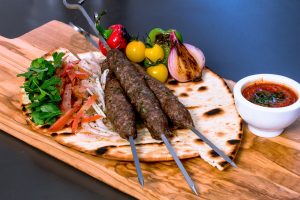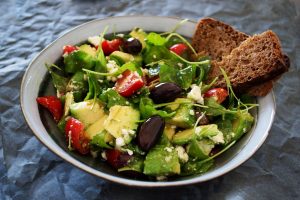With permission, Nabeela Mansuri’s tips for a healthy Ramadan diet will be shared to help the community.
As we enjoy Ramadan, it’s essential to focus not only on spiritual growth but also on maintaining optimal health during this holy month of fasting. This guide will provide you with expert advice on how to nourish your body while observing the fast, ensuring you have a fulfilling and energising Ramadan experience.
Understanding the Importance of Nutrition During Ramadan
Ramadan fasting, which involves abstaining from food and drink from dawn to sunset, can significantly impact your body’s nutritional needs. A well-planned diet during non-fasting hours is crucial to maintain energy levels, support bodily functions, and prevent health issues.
Key Principles for a Healthy Ramadan Diet
1. Hydration is Paramount
- Aim to consume at least 2-3 litres of water between Iftar and Suhoor.
- Increase water intake based on your activity level.
- Infuse water with lemon, cucumber, or mint for added flavour and nutrients.
- Consider adding electrolytes to your water, especially if you’re physically active.
- Include water-rich fruits and vegetables in your diet:
- Watermelon (92% water)
- Cucumbers (96% water)
- Strawberries (91% water)
- Tomatoes (95% water)
- Oranges (88% water)
2. Balanced Iftar (Breaking the Fast)
- Start with dates and water, following the prophetic tradition.
- Begin with a light soup to rehydrate and prepare your stomach.
- Include a protein-rich main course with lean meats, fish, or plant-based proteins.
- Add complex carbohydrates like whole grains for sustained energy.
- Incorporate a variety of vegetables for essential vitamins and minerals.
- Conclude with antioxidant-rich fruits like berries or pomegranates.
3. Nutrient-Dense Suhoor (Pre-dawn Meal)
- Focus on foods that provide long-lasting energy:
- Complex carbohydrates (oats, whole grain bread, brown rice, quinoa)
- High-quality proteins (eggs, Greek yogurt, lean meats)
- Healthy fats (avocado, nuts, seeds)
- Include fibre-rich foods to aid digestion and prevent constipation.
- Don’t skip Suhoor – it’s crucial for sustaining energy throughout the day.
4. Smart Snacking Between Iftar and Suhoor
- Choose nutrient-dense snacks like:
- Fresh fruits and vegetables
- Nuts and seeds
- Whole grain crackers with hummus
- Avoid excessive sweets and fried foods, which can lead to indigestion and weight gain.
The Power of Complex Carbohydrates
Complex carbohydrates are your best friends during Ramadan. They take longer for your body to break down, resulting in:
- Slower release of energy throughout the day
- Feeling fuller for longer
- Reduced sluggishness
- Prevention of bloating when eaten at Iftar
- Healthier hearts by reducing cholesterol and blood pressure
Incorporate these complex carbohydrates into your meals:
- Whole fruits: bananas, apples, pears
- Vegetables: carrots, potatoes, squash, onions
- Whole grains: oats, brown rice, quinoa, wheat
- Wholemeal bread
- Legumes: beans (kidney, black, white), lentils, chickpeas
The Importance of Protein
Protein is essential for everyone, not just bodybuilders and athletes. It’s crucial for growth, repair, and maintaining good health. Benefits of adequate protein intake during Ramadan include:
- Keeping you full
- Reducing cravings
- Lowering blood pressure
Include these protein sources in your meals:
- Lean meats: beef, lamb
- Poultry: chicken, turkey, duck
- Seafood: fish, prawns, oysters
- Dairy: milk, Greek yogurt, cheese
- Plant-based options: edamame beans, green peas, guava, kiwi, avocados

Meal Planning for Optimal Nutrition
Iftar Ideas:
- Date and water (to break the fast) → Vegetable soup → Grilled chicken breast with quinoa and roasted vegetables
- Date and water → Lentil soup → Baked fish with sweet potato and steamed broccoli
- Date and water → Chickpea salad → Lean beef kebabs with brown rice and mixed greens
Suhoor Ideas:
- Overnight oats with chia seeds, berries, and a dollop of Greek yogurt
- Whole grain toast with avocado and boiled eggs
- Vegetable omelet with a side of fresh fruit and a handful of nuts
Special Considerations
Managing Chronic Conditions
- Consult with your healthcare provider before Ramadan to adjust medication schedules and dietary needs.
- Patients with diabetes, hypertension, or other chronic conditions may need to modify their fasting practices.
Staying Active
- Plan your exercise routine around meal times to replenish energy stores promptly.
- Listen to your body and adjust intensity as needed.
- Focus on low to moderate-intensity exercises during fasting hours.
Gradual Transitions
- In the weeks leading up to Ramadan, gradually adjust your sleep and meal schedules.
- Slowly reduce caffeine intake to minimise withdrawal symptoms during the fast.
Mindful Eating Practices
- Eat slowly and mindfully, savoring each bite.
- Use smaller plates to control portion sizes.
- Listen to your body’s hunger and fullness cues.
- Avoid overeating during Iftar, which can lead to discomfort and poor sleep.
Foods to Limit
While diet and fitness are important, they shouldn’t be a burden during Ramadan. To make the most of this blessed month:
- Limit intake of processed or fried foods, which can irritate your digestive system after a day of fasting.
- Avoid caffeinated drinks and foods with higher sodium content, as these can increase thirst during fasting hours.
Celebrating Responsibly
While Ramadan is a time for celebration and community, it’s important to maintain a balance:
- Enjoy traditional foods in moderation.
- Offer healthier alternatives at gatherings.
- Focus on the spiritual and social aspects of meals rather than overindulgence.
Unlocking Prophetic Nutrition during Ramadan
For those looking to explore the benefits of a Prophetic approach to nutrition in more depth, “Ghiza: Unlocking the Secret of Prophetic Nutrition and Medicine” is an excellent resource. This book delves into the wisdom of the Prophet Muhammad (PBUH) on diet, nutrition, and wellness, offering practical advice and recipes to nourish the body while enhancing spiritual growth. You can find the book on Amazon.
Conclusion
A healthy Ramadan diet is about nourishing both body and soul. By following these guidelines, you can ensure that your fasting experience is not only spiritually fulfilling but also physically beneficial. Remember, the goal is to emerge from Ramadan feeling energised, healthy, and spiritually renewed.
May this Ramadan bring you blessings, good health, and inner peace. Ramadan Kareem!




